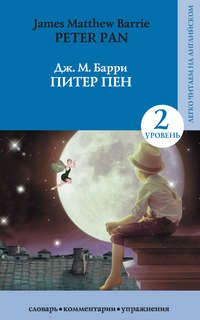Kitobni o'qish: «Питер Пен / Peter Pan»
Адаптация текста, упражнения, комментарии и словарь С. А. Матвеева
© ООО «Издательство АСТ», 2020
Chapter 1
Peter Breaks Through1
All children, except one, grow up. They soon know that they will grow up. Wendy knew this, too. One day when she was two years old she was playing in a garden, and she plucked a flower and ran with it to her mother. Mrs. Darling cried, “Oh, why can’t you remain like this forever!” But Wendy knew that she must grow up.
There were three children in the family: Wendy, John, and Michael. The Darlings were poor, and the nurse for the children was a dog, called Nana. She was an excellent nurse. Of course her kennel was in the nursery. The nursery was wide and airy, with a large window, and a bright fire with a high fire-guard round it, and a big clock, and nursery-rhyme pictures over the walls.There never was a happier family2 until the coming of Peter Pan.
Mrs. Darling first heard of Peter when she was putting her children to bed.She knew of no Peter3, and yet he was here and there in John and Michael and Wendy’s minds. Children often talked about the island of Neverland4 and Peter Pan who lived there.
Mrs. Darling remembered Peter Pan who lived with the fairies, they said. There were odd stories about him. She believed in him when she was a girl, but now that she was marriedshe doubted whether there was any such person5.
“Besides,” she said to Wendy, “he is adult now.”
“Oh no, he isn’t grown up,” Wendy assured her confidently, “and he is just my size.” She meant that he was her size in both mind and body; she didn’t know how she knew, she just knew it.
Mrs. Darling consulted Mr. Darling, but he just smiled. “It is some nonsense,” he said.
On the night on which our story begins, Nana was dozing peacefully by the fireside, with her head between her paws. All the children were in bed.

